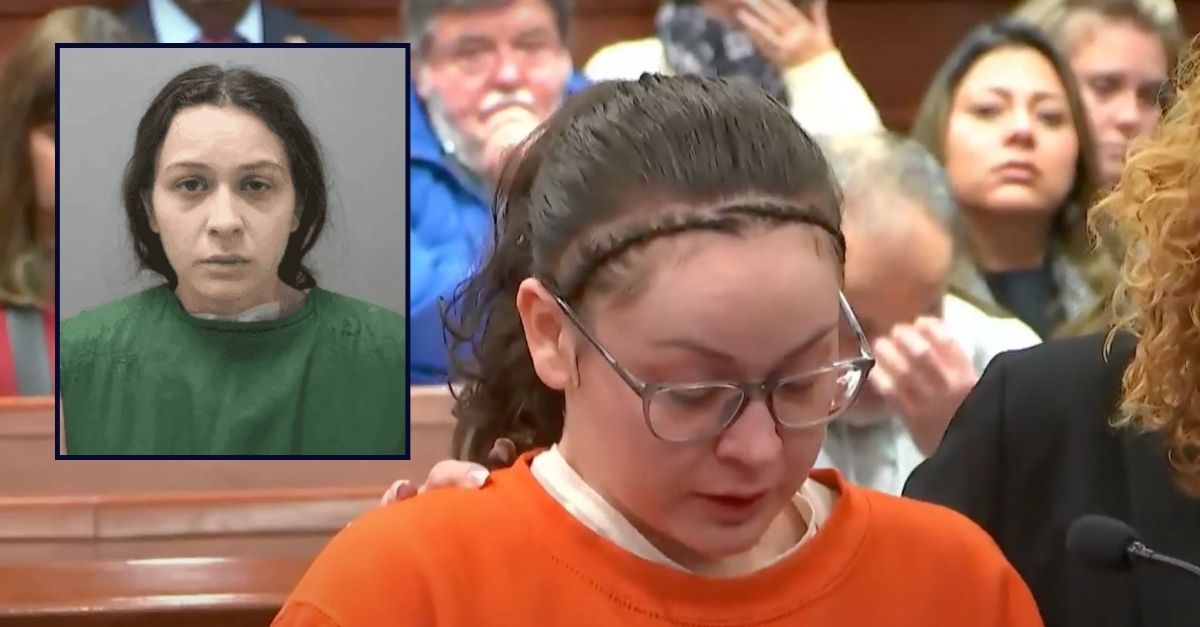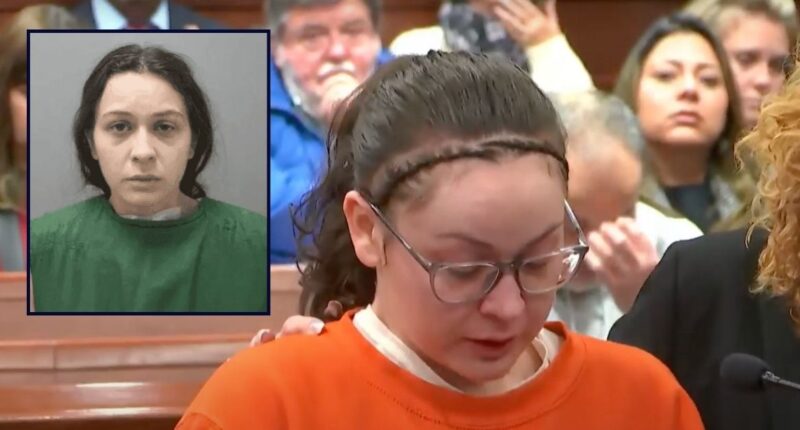
Inset: Chloe Driver from the Cherokee County Sheriff’s Office. Background: Driver can be seen shedding tears during her sentencing hearing related to her daughter’s murder on YouTube via Law&Crime.
A Georgia mom will spend several decades behind bars for the brutal stabbing murder of her toddler daughter — but she was granted the possibility of parole after serving 30 years in state prison.
In November, Chloe Alexis Driver, 24, was convicted on multiple counts including malice murder, felony murder, cruelty to children in the first degree, and aggravated assault. Cherokee County jurors found her guilty on all charges but also determined that she was legally “mentally ill,” which was a mitigating factor.
On Thursday morning, Cherokee County Superior Court Chief Judge Ellen McElyea intoned with audible pathos — her voice traipsing through some areas of despair — when handing down the sentence.
“This was a heinous offense with evidence that was so graphic and so traumatic that I began to do research on what kind of support and help we could give the jurors who were having to consider it,” the judge said, directly addressing the defendant. “A parent killing a child is something that just offends us on the deepest level. It is a wrong that just is unfathomable. It just cannot be understood. And it scares us — because it is so contrary to just fundamental moral behavior and what we expect of the bonds between human beings.”
The sentencing comes nearly four years to the day after the murder of 13-month-old Hannah Nicole Driver.
On Dec. 8, 2020, authorities discovered the helpless child suffering from multiple stab wounds inside a bedroom at the mother’s residence on Mountain Vista Boulevard — a suburban subdivision in Canton, a small city located roughly 40 miles due north of Atlanta.
Police rushed Hannah to a nearby hospital where she later succumbed to her injuries. Driver was admitted to a different hospital that day for “life-threatening injuries,” according to the initial Canton Police Department press release about the violence.
On Dec. 22, 2020, Driver was indicted.
Hannah’s mother had stabbed her, over and over, in the throat with a kitchen knife, a forensic psychologist testified during the trial.
As the perplexed killer watched her child bleed out, she wondered why the girl did not die immediately like the characters in the video games she played did when they were stabbed. Then, Driver stabbed herself three times in the throat; finding self-death similarly not so easy to obtain, she stabbed herself once in the heart.
Later, dueling narratives of the crime followed. Driver’s defense stuck to the insanity method. Significant testimony from more than one medical professional supported this storyline.
The state, on the other hand, said Driver killed her daughter so she could be alone with Hannah’s father — who just so happened to be a member of an alleged “polygamist group” that allegedly drank urine together ritualistically among other such practices. The father, Benyamin Ben-Michaeil, allegedly had at least two other wives at the time of the slaying.
During the trial, the two narratives collided and intermixed.
According to testimony, the situation with Hannah’s father having multiple wives eventually led Driver down the path to believe she was a hopeless sinner who could never give her daughter a normal life, and that she was being magically urged by the others to kill herself and her baby girl.
“She believed she was downloading her sin — all the bad parts about her — into her child through breastfeeding,” Dr. McLendon Garrett testified. “She also talked about pouring her sin into the child.”
Jason Spillars, one witness who testified for the state, revealed that Driver was the first woman to be with the polygamist — well before the other wives came along. On the day in question, Spillars called 911 after hearing a scream and finding the gore inside the house.
“It was like a massacre,” he testified.
In the end, Driver’s trial and conviction took all of eight days — arguments and testimony were over in exactly one week inclusive of one weekend; jurors then deliberated for less than a day.
During the sentencing hearing, prosecutors requested life without the possibility of parole. All of the sentences for each of the counts “merged,” were vacated for being duplicative, or were otherwise less than the maximum punishment requested.
Ben-Michaeil provided an impact statement focused on the little girl; as Hannah’s father took the stand, Driver appeared to radiate contempt; as he testified, the camera panned back to Driver — her face registered various levels of anger and confusion.
“Nothing that actually happened to her would ever change her,” Ben-Michaeil said in response to a prosecutor’s question about punishment for the mother of his child.
The murderess herself sobbed throughout the proceedings.
During her allocution, she expressed remorse, apologized for her actions, promised to work toward obtaining a clean bill of mental health, and said she would accept her sentence no matter what it was.
“In the past, I genuinely believed I had to die every day for my daughter, to hate myself for my failure in protecting her, but I know now that life goes on whether I suffer or not,” Driver told the court. “So, I need to stop taking from it. I know now that that I must live for my daughter instead and do the best I can to be kind and loving and giving. Because that’s exactly what being with Hannah taught me. I see her everywhere, in everything. She lives on and shows me that beauty can be found anywhere, even where I’m going. Because I can feel her in my tears. I feel her in my friend’s embrace. I see her in a stranger’s kindness and someone’s undiluted joy at seeing their loved one. I hear her in people’s laughter. And I know her most of all in my family’s loyal love for me even still.”






